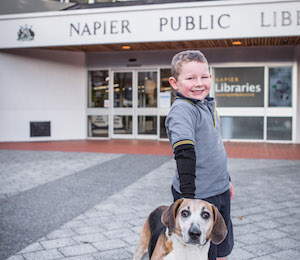
Called All Ears, it is aimed at building the confidence of young readers by having them read aloud to a dog, as well as teaching children how to be safe around animals.
Overseas studies have shown reading to animals is proven to remove stress and peer pressure often experienced by children that are still learning to read.
Unlike many other animal reading initiatives, All Ears is a one-on-one programme in which the child reads to the dog once a week for a full school term – allowing the reader and the dog to get to know each other.
All Ears is a co-operative project between the Napier City Council Animal Control team and the Napier Library. Junior readers participating in the programme are recommended by local remedial teachers. The first intake will be four students from Napier Central School.
The project has recruited its first dog to be part of the programme – a nine-year-old Harrier hound called Lady Venice. In a former life, she ran with hunting horses but now in retirement, there is nothing Lady Venice enjoys more than listening to a good story.
“Reading dogs aid young struggling readers by sitting quietly with each one and ‘listening’ as the child reads aloud to them,” Napier Libraries manager Sheryl Reed said.
“Though typically self-conscious reading to another person, children with reading difficulties are much more relaxed with a friendly dog who doesn’t criticise their efforts or laugh at their mistakes.”
Lady Venice was rescued by Napier City Council animal control officer Liisa Jones and when she’s not listening to budding readers, she will continue to live with Liisa and her family.
The first reading dog scheme was the R.E.A.D. (Reading Education Assistance Dogs) programme, set up in Salt Lake City in 1999. Since then the idea has been successfully copied all around the world, in places such as Canada, Italy, Slovenia, South Africa, and Australia.
The much-delayed English draft curriculum is now out for consultation, generating discussion from teachers.
Research from AUT demonstrates arts, culture and recreation have positive impacts on all aspects of…
How effective has the school phone ban been in achieving its aims? Researchers from the…
School camps and excursions deliver hands on learning experiences, helping to consolidate classroom learning.
Innovations in AV technologies present new opportunities to engage with students. We look at how…
A new report from the University of Auckland’s Our Voices Project asks young people what…
This website uses cookies.